CRIMINAL JUSTICE: An Overview of Punishment Philosophies
VerifiedAdded on 2022/11/23
|7
|1071
|358
Report
AI Summary
This report provides an overview of punishment philosophies within the criminal justice system. It begins by outlining the core principles of deterrence, retribution, rehabilitation, and incapacitation, which are central to understanding the goals and justifications of punishment. The report discusses the practical objectives of criminal justice, particularly incapacitation, and its limitations. It then explores retribution, emphasizing the doctrine of proportionality, and the challenges in impartially assessing criminal responsibility. The report also highlights the philosophy of rehabilitation, presenting it as a preferable alternative to retribution, focusing on the state's duty to assist offenders in becoming law-abiding citizens, and reducing reoffending. The conclusion suggests combining elements of these theories, advocating for rehabilitation where possible, deterrence when necessary, and restoration in conjunction with retribution. The report underscores the importance of understanding these philosophies to inform correctional and political policies.
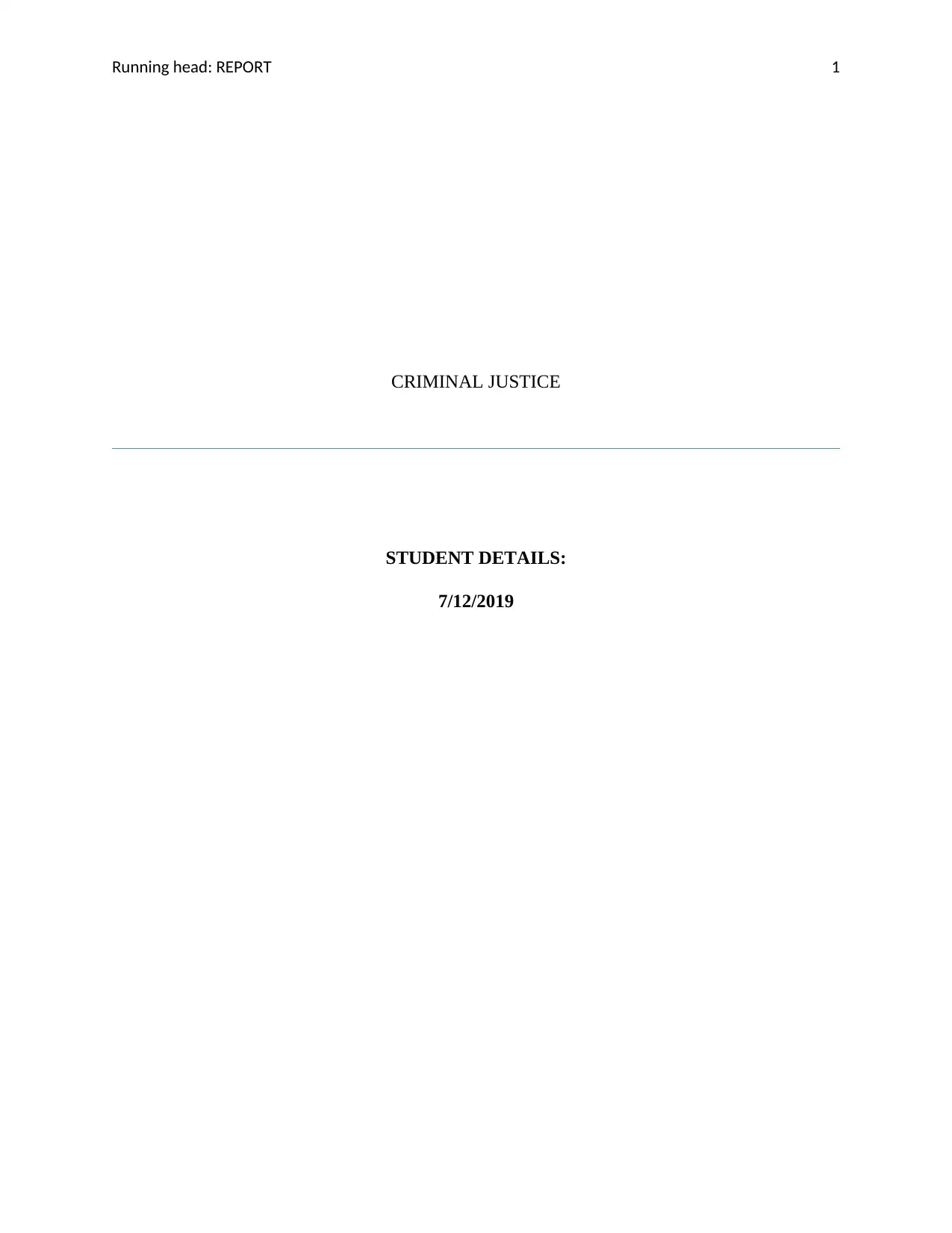
Running head: REPORT 1
CRIMINAL JUSTICE
STUDENT DETAILS:
7/12/2019
CRIMINAL JUSTICE
STUDENT DETAILS:
7/12/2019
Paraphrase This Document
Need a fresh take? Get an instant paraphrase of this document with our AI Paraphraser
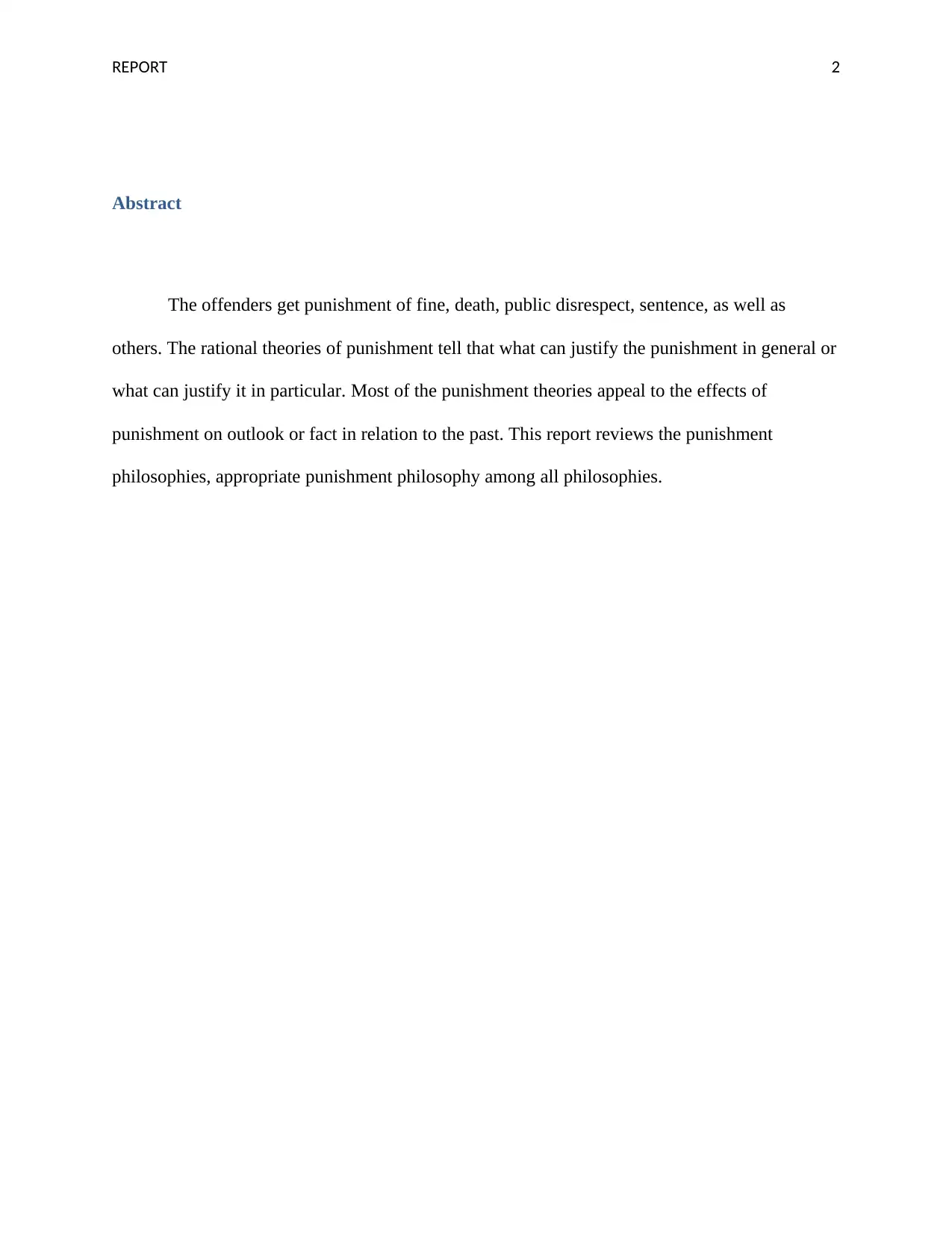
REPORT 2
Abstract
The offenders get punishment of fine, death, public disrespect, sentence, as well as
others. The rational theories of punishment tell that what can justify the punishment in general or
what can justify it in particular. Most of the punishment theories appeal to the effects of
punishment on outlook or fact in relation to the past. This report reviews the punishment
philosophies, appropriate punishment philosophy among all philosophies.
Abstract
The offenders get punishment of fine, death, public disrespect, sentence, as well as
others. The rational theories of punishment tell that what can justify the punishment in general or
what can justify it in particular. Most of the punishment theories appeal to the effects of
punishment on outlook or fact in relation to the past. This report reviews the punishment
philosophies, appropriate punishment philosophy among all philosophies.
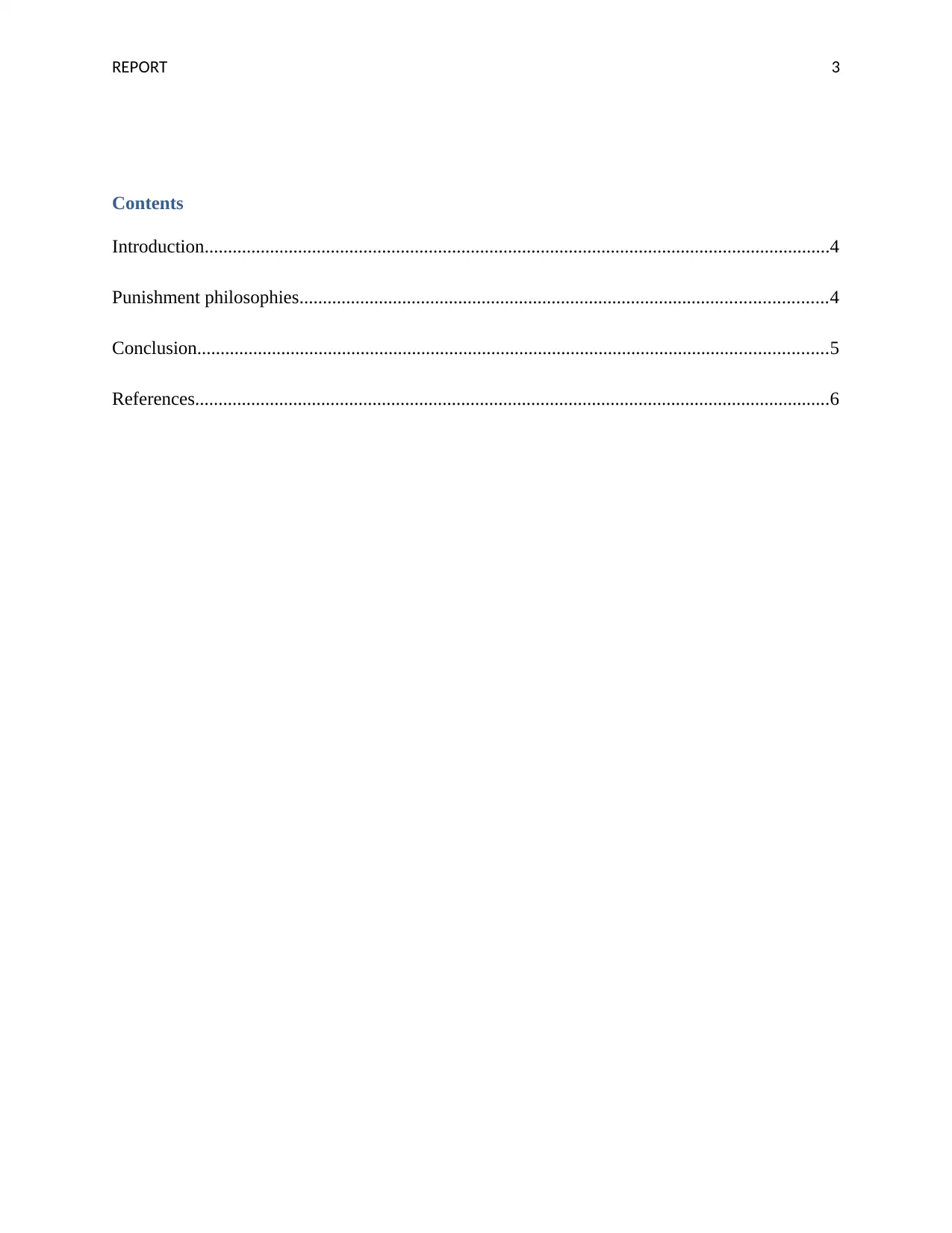
REPORT 3
Contents
Introduction......................................................................................................................................4
Punishment philosophies.................................................................................................................4
Conclusion.......................................................................................................................................5
References........................................................................................................................................6
Contents
Introduction......................................................................................................................................4
Punishment philosophies.................................................................................................................4
Conclusion.......................................................................................................................................5
References........................................................................................................................................6
⊘ This is a preview!⊘
Do you want full access?
Subscribe today to unlock all pages.

Trusted by 1+ million students worldwide
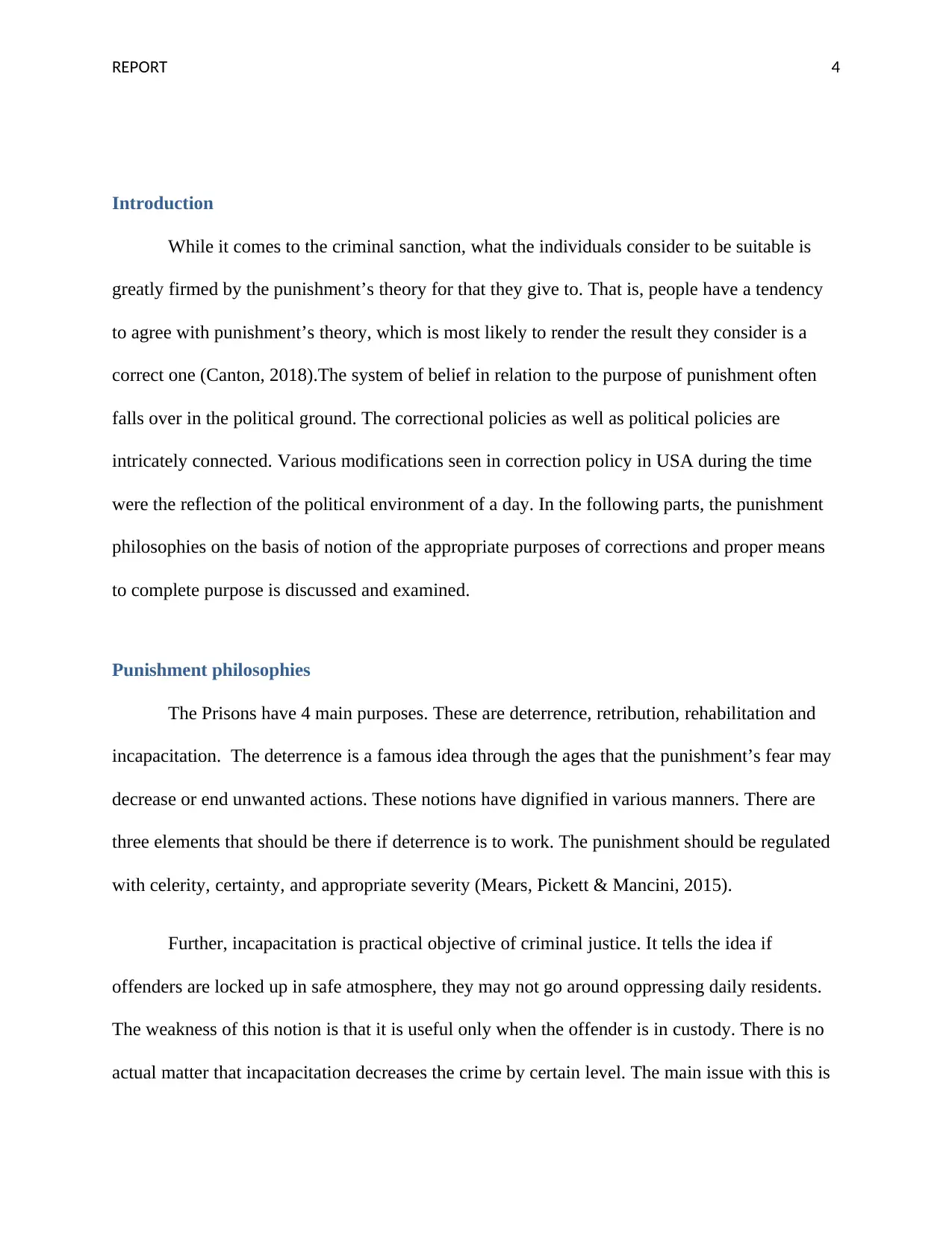
REPORT 4
Introduction
While it comes to the criminal sanction, what the individuals consider to be suitable is
greatly firmed by the punishment’s theory for that they give to. That is, people have a tendency
to agree with punishment’s theory, which is most likely to render the result they consider is a
correct one (Canton, 2018).The system of belief in relation to the purpose of punishment often
falls over in the political ground. The correctional policies as well as political policies are
intricately connected. Various modifications seen in correction policy in USA during the time
were the reflection of the political environment of a day. In the following parts, the punishment
philosophies on the basis of notion of the appropriate purposes of corrections and proper means
to complete purpose is discussed and examined.
Punishment philosophies
The Prisons have 4 main purposes. These are deterrence, retribution, rehabilitation and
incapacitation. The deterrence is a famous idea through the ages that the punishment’s fear may
decrease or end unwanted actions. These notions have dignified in various manners. There are
three elements that should be there if deterrence is to work. The punishment should be regulated
with celerity, certainty, and appropriate severity (Mears, Pickett & Mancini, 2015).
Further, incapacitation is practical objective of criminal justice. It tells the idea if
offenders are locked up in safe atmosphere, they may not go around oppressing daily residents.
The weakness of this notion is that it is useful only when the offender is in custody. There is no
actual matter that incapacitation decreases the crime by certain level. The main issue with this is
Introduction
While it comes to the criminal sanction, what the individuals consider to be suitable is
greatly firmed by the punishment’s theory for that they give to. That is, people have a tendency
to agree with punishment’s theory, which is most likely to render the result they consider is a
correct one (Canton, 2018).The system of belief in relation to the purpose of punishment often
falls over in the political ground. The correctional policies as well as political policies are
intricately connected. Various modifications seen in correction policy in USA during the time
were the reflection of the political environment of a day. In the following parts, the punishment
philosophies on the basis of notion of the appropriate purposes of corrections and proper means
to complete purpose is discussed and examined.
Punishment philosophies
The Prisons have 4 main purposes. These are deterrence, retribution, rehabilitation and
incapacitation. The deterrence is a famous idea through the ages that the punishment’s fear may
decrease or end unwanted actions. These notions have dignified in various manners. There are
three elements that should be there if deterrence is to work. The punishment should be regulated
with celerity, certainty, and appropriate severity (Mears, Pickett & Mancini, 2015).
Further, incapacitation is practical objective of criminal justice. It tells the idea if
offenders are locked up in safe atmosphere, they may not go around oppressing daily residents.
The weakness of this notion is that it is useful only when the offender is in custody. There is no
actual matter that incapacitation decreases the crime by certain level. The main issue with this is
Paraphrase This Document
Need a fresh take? Get an instant paraphrase of this document with our AI Paraphraser
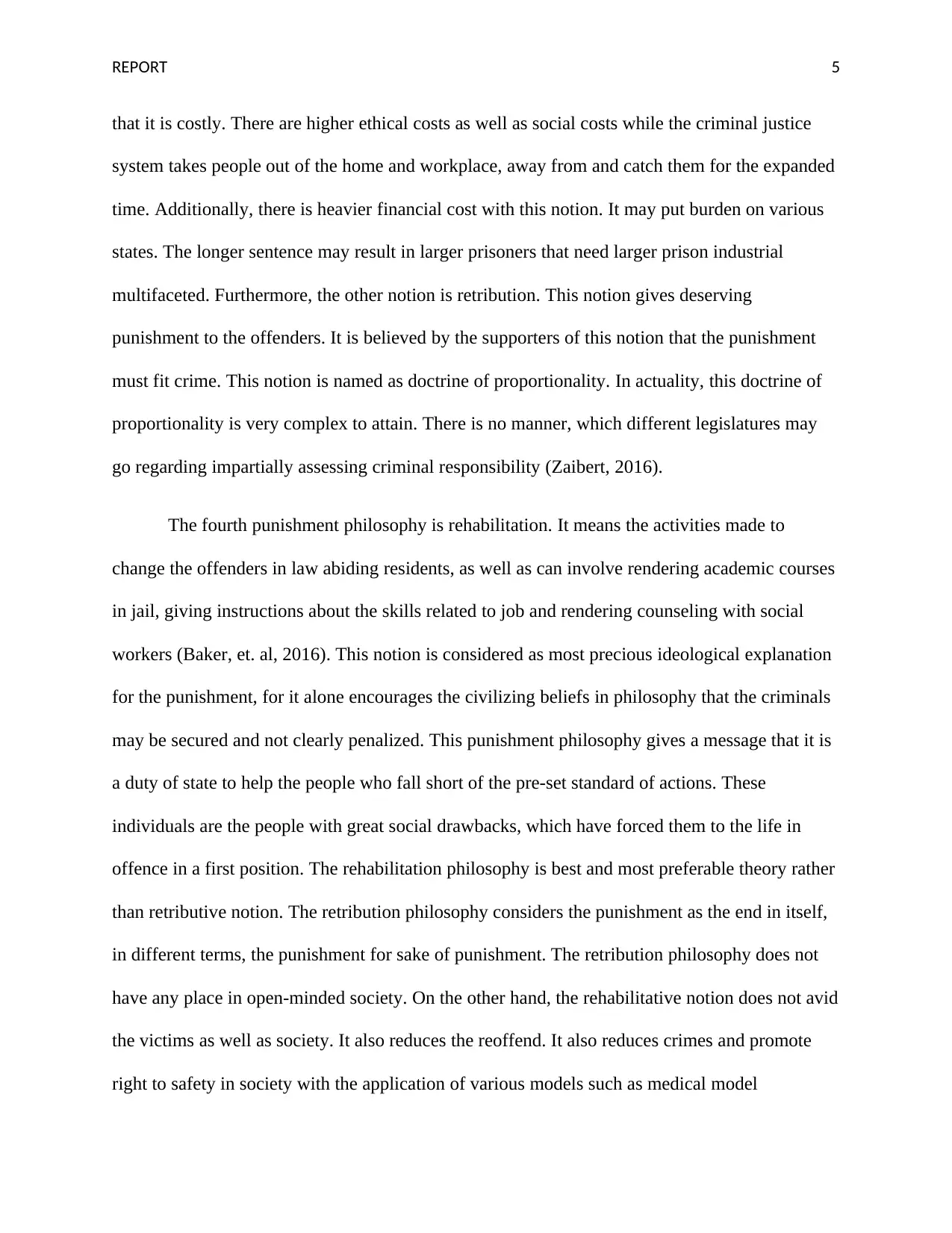
REPORT 5
that it is costly. There are higher ethical costs as well as social costs while the criminal justice
system takes people out of the home and workplace, away from and catch them for the expanded
time. Additionally, there is heavier financial cost with this notion. It may put burden on various
states. The longer sentence may result in larger prisoners that need larger prison industrial
multifaceted. Furthermore, the other notion is retribution. This notion gives deserving
punishment to the offenders. It is believed by the supporters of this notion that the punishment
must fit crime. This notion is named as doctrine of proportionality. In actuality, this doctrine of
proportionality is very complex to attain. There is no manner, which different legislatures may
go regarding impartially assessing criminal responsibility (Zaibert, 2016).
The fourth punishment philosophy is rehabilitation. It means the activities made to
change the offenders in law abiding residents, as well as can involve rendering academic courses
in jail, giving instructions about the skills related to job and rendering counseling with social
workers (Baker, et. al, 2016). This notion is considered as most precious ideological explanation
for the punishment, for it alone encourages the civilizing beliefs in philosophy that the criminals
may be secured and not clearly penalized. This punishment philosophy gives a message that it is
a duty of state to help the people who fall short of the pre-set standard of actions. These
individuals are the people with great social drawbacks, which have forced them to the life in
offence in a first position. The rehabilitation philosophy is best and most preferable theory rather
than retributive notion. The retribution philosophy considers the punishment as the end in itself,
in different terms, the punishment for sake of punishment. The retribution philosophy does not
have any place in open-minded society. On the other hand, the rehabilitative notion does not avid
the victims as well as society. It also reduces the reoffend. It also reduces crimes and promote
right to safety in society with the application of various models such as medical model
that it is costly. There are higher ethical costs as well as social costs while the criminal justice
system takes people out of the home and workplace, away from and catch them for the expanded
time. Additionally, there is heavier financial cost with this notion. It may put burden on various
states. The longer sentence may result in larger prisoners that need larger prison industrial
multifaceted. Furthermore, the other notion is retribution. This notion gives deserving
punishment to the offenders. It is believed by the supporters of this notion that the punishment
must fit crime. This notion is named as doctrine of proportionality. In actuality, this doctrine of
proportionality is very complex to attain. There is no manner, which different legislatures may
go regarding impartially assessing criminal responsibility (Zaibert, 2016).
The fourth punishment philosophy is rehabilitation. It means the activities made to
change the offenders in law abiding residents, as well as can involve rendering academic courses
in jail, giving instructions about the skills related to job and rendering counseling with social
workers (Baker, et. al, 2016). This notion is considered as most precious ideological explanation
for the punishment, for it alone encourages the civilizing beliefs in philosophy that the criminals
may be secured and not clearly penalized. This punishment philosophy gives a message that it is
a duty of state to help the people who fall short of the pre-set standard of actions. These
individuals are the people with great social drawbacks, which have forced them to the life in
offence in a first position. The rehabilitation philosophy is best and most preferable theory rather
than retributive notion. The retribution philosophy considers the punishment as the end in itself,
in different terms, the punishment for sake of punishment. The retribution philosophy does not
have any place in open-minded society. On the other hand, the rehabilitative notion does not avid
the victims as well as society. It also reduces the reoffend. It also reduces crimes and promote
right to safety in society with the application of various models such as medical model
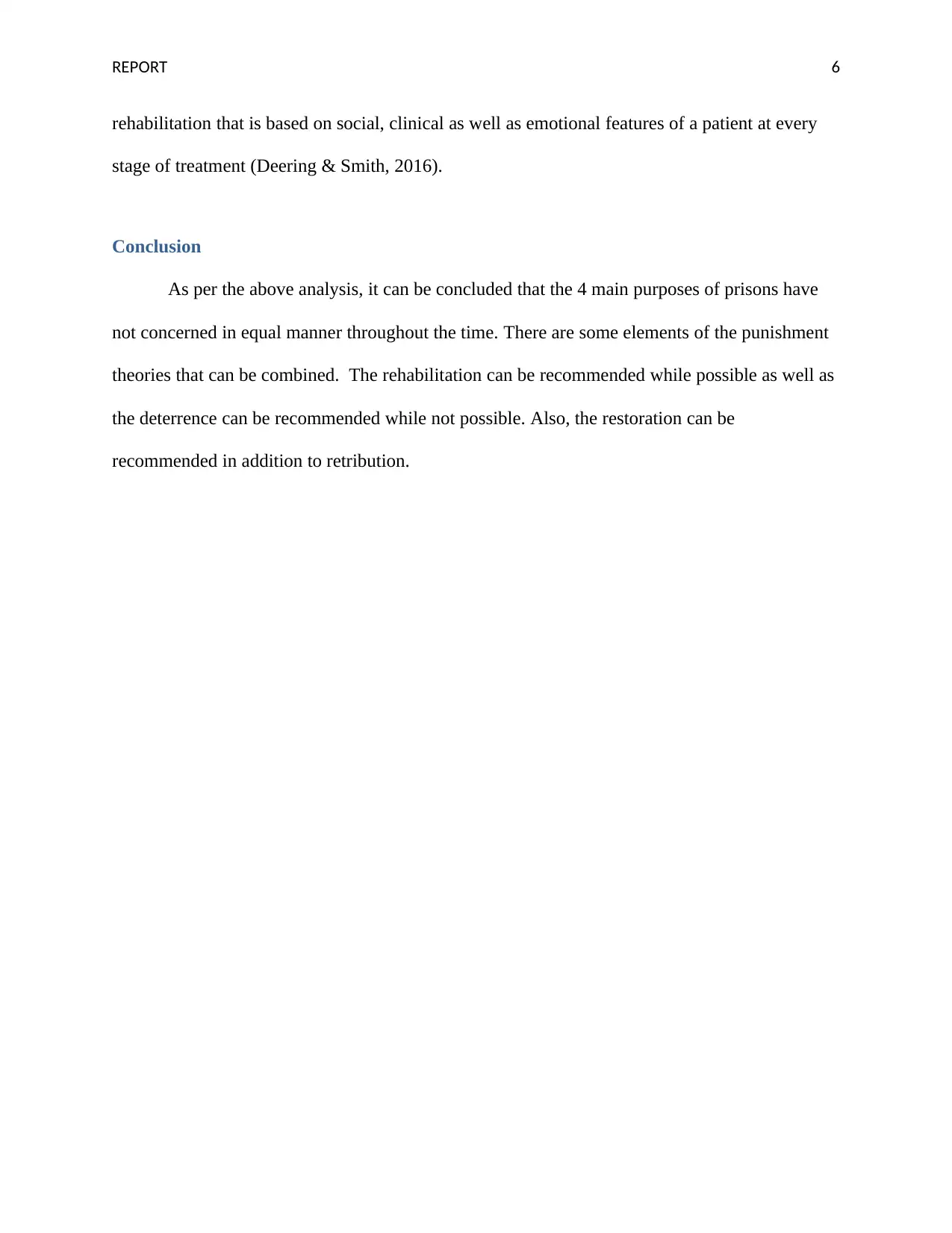
REPORT 6
rehabilitation that is based on social, clinical as well as emotional features of a patient at every
stage of treatment (Deering & Smith, 2016).
Conclusion
As per the above analysis, it can be concluded that the 4 main purposes of prisons have
not concerned in equal manner throughout the time. There are some elements of the punishment
theories that can be combined. The rehabilitation can be recommended while possible as well as
the deterrence can be recommended while not possible. Also, the restoration can be
recommended in addition to retribution.
rehabilitation that is based on social, clinical as well as emotional features of a patient at every
stage of treatment (Deering & Smith, 2016).
Conclusion
As per the above analysis, it can be concluded that the 4 main purposes of prisons have
not concerned in equal manner throughout the time. There are some elements of the punishment
theories that can be combined. The rehabilitation can be recommended while possible as well as
the deterrence can be recommended while not possible. Also, the restoration can be
recommended in addition to retribution.
⊘ This is a preview!⊘
Do you want full access?
Subscribe today to unlock all pages.

Trusted by 1+ million students worldwide
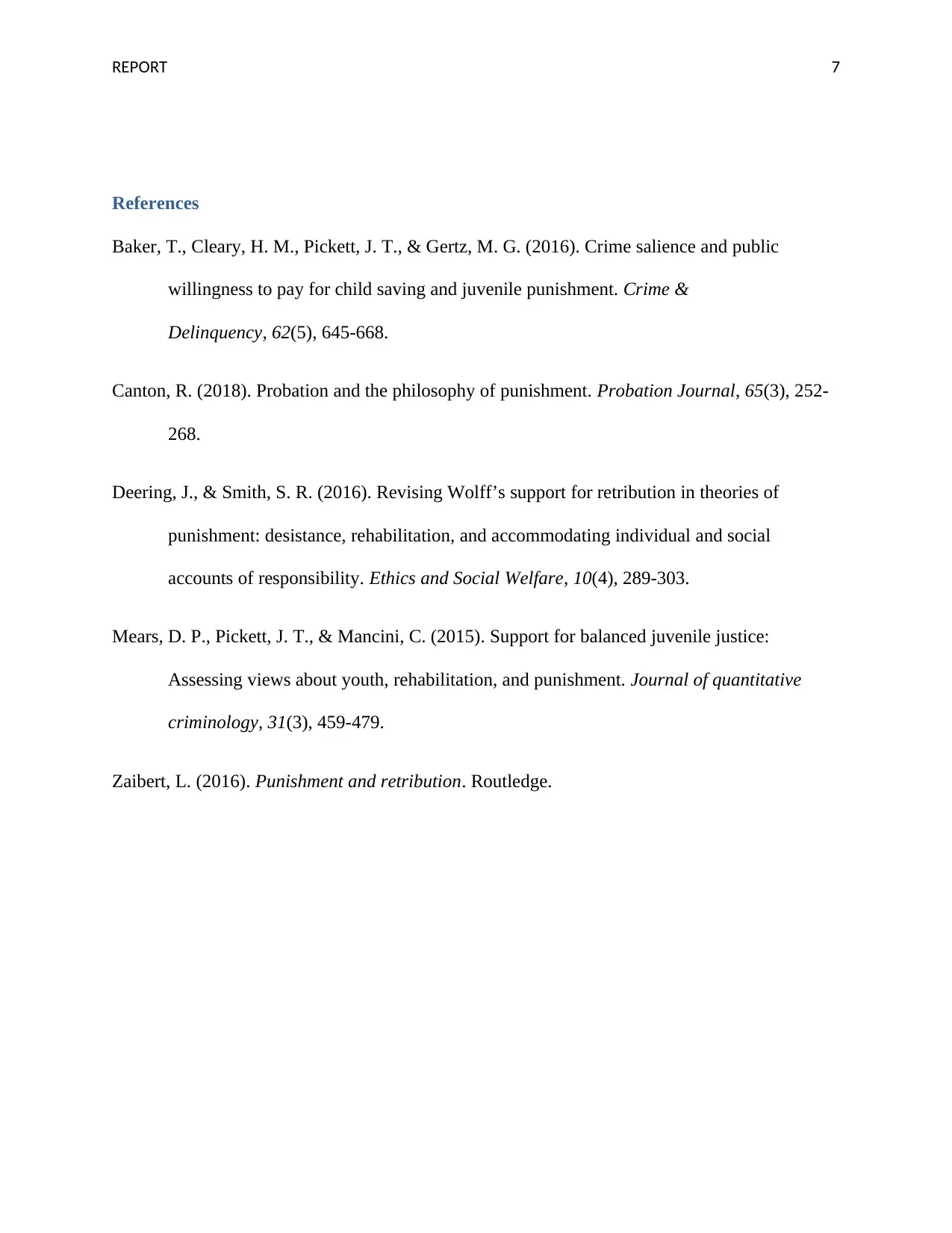
REPORT 7
References
Baker, T., Cleary, H. M., Pickett, J. T., & Gertz, M. G. (2016). Crime salience and public
willingness to pay for child saving and juvenile punishment. Crime &
Delinquency, 62(5), 645-668.
Canton, R. (2018). Probation and the philosophy of punishment. Probation Journal, 65(3), 252-
268.
Deering, J., & Smith, S. R. (2016). Revising Wolff’s support for retribution in theories of
punishment: desistance, rehabilitation, and accommodating individual and social
accounts of responsibility. Ethics and Social Welfare, 10(4), 289-303.
Mears, D. P., Pickett, J. T., & Mancini, C. (2015). Support for balanced juvenile justice:
Assessing views about youth, rehabilitation, and punishment. Journal of quantitative
criminology, 31(3), 459-479.
Zaibert, L. (2016). Punishment and retribution. Routledge.
References
Baker, T., Cleary, H. M., Pickett, J. T., & Gertz, M. G. (2016). Crime salience and public
willingness to pay for child saving and juvenile punishment. Crime &
Delinquency, 62(5), 645-668.
Canton, R. (2018). Probation and the philosophy of punishment. Probation Journal, 65(3), 252-
268.
Deering, J., & Smith, S. R. (2016). Revising Wolff’s support for retribution in theories of
punishment: desistance, rehabilitation, and accommodating individual and social
accounts of responsibility. Ethics and Social Welfare, 10(4), 289-303.
Mears, D. P., Pickett, J. T., & Mancini, C. (2015). Support for balanced juvenile justice:
Assessing views about youth, rehabilitation, and punishment. Journal of quantitative
criminology, 31(3), 459-479.
Zaibert, L. (2016). Punishment and retribution. Routledge.
1 out of 7
Related Documents
Your All-in-One AI-Powered Toolkit for Academic Success.
+13062052269
info@desklib.com
Available 24*7 on WhatsApp / Email
![[object Object]](/_next/static/media/star-bottom.7253800d.svg)
Unlock your academic potential
Copyright © 2020–2026 A2Z Services. All Rights Reserved. Developed and managed by ZUCOL.




